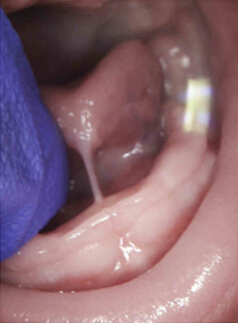Tongue Tie Evaluation & Treatment
We provide gentle, effective care for children and adults experiencing the challenges of being tongue tied, including breastfeeding difficulties, speech issues, and jaw strain. Our team specializes in understanding how a tongue tie TMJ connection can impact overall oral function.
Understanding Tongue Tie and Oral Function
A tongue tie occurs when the tissue beneath the tongue (the lingual frenulum) is unusually short, thick, or tight. This restriction can limit movement and affect breathing, swallowing, digestion, and overall oral development. In infants, an infant tongue tie often contributes to poor latch, fussiness, and feeding challenges, while older children and adults may notice speech concerns, airway issues, or tension in the jaw and neck.
At the TMJ & Sleep Therapy Centre of the Gorge, we also evaluate how a tongue tie can influence jaw alignment and muscle function. Many patients with a posterior tongue tie or long-standing restriction develop compensations that contribute to bite problems, facial tension, and even TMJ-related symptoms. Our comprehensive assessments ensure that both the tongue and jaw are treated as part of a connected system. Contact us today at (541) 386-2999 to schedule an appointment.
Benefits of Tongue Tie Treatment
Treating a tongue tie can make a profound difference in how the tongue, jaw, and airway function together. Whether it’s an infant tongue tie affecting early feeding or a posterior tongue tie contributing to long-term oral and TMJ issues, releasing the restriction allows the tongue to move more naturally and efficiently. This improved mobility supports healthy growth, better breathing, and more balanced muscle function throughout the face, neck, and jaw. As a result, patients of all ages often experience meaningful improvements in comfort, development, and overall quality of life. Here are some other benefits:
- Improved breastfeeding outcomes for tied tongue in newborns, including better latch and reduced maternal discomfort
- Enhanced speech clarity and oral coordination in children and adults
- Better airway function and nasal breathing support
- Reduction in strain on the jaw and relief from tongue tie TMJ tension
- Healthier swallowing patterns and improved eating efficiency
- Greater tongue mobility, reducing long-term compensations caused by a posterior tongue tie
Frequently Asked Questions About Tongue Ties and TMJ Disorders
Q: What is a tongue tie and how does it affect oral function?
Q: What are the signs of an infant tongue tie?
Q: What is a posterior tongue tie?
Q: Can a tongue tie affect TMJ or jaw function?
Q: Does treatment help tied tongue in newborns?
Q: Where can I find a tongue tie specialist near me?
Doctor & Customer Approved
Trusted By Our Many Patients
Who We Are
Our Experts
CURTIS HAYNIE
Dr Haynie is grateful for the opportunity to practice in his hometown and loves accessing all the activities it provides. His goal is to always live the moment in the Gorge with his family Julia, Aidan, and Ava.
William Payne
Dr. Payne enjoys collaborating with the skilled doctors and team at Hood River Dental and is proud to bring his many years of experience in quality, comfortable dental care to the Hood River community.



